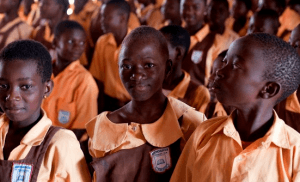Less than 2% of special needs children in school – Director
 Less than two per cent of the estimated number of children with special needs in Ghana are special schools and units across the country.
Less than two per cent of the estimated number of children with special needs in Ghana are special schools and units across the country.
The 6,314 children are made up of 3,614 males and 2,700 females.
Mr Anthony Boateng, Director of the Special Education Division of Ghana Education Service Division, who announced this, said the situation is unpleasant at the senior high school level.
The statistics, he said “should clearly indicate to us that more ought to be done in our collective efforts at providing education for children with special needs in the country”.
Mr Boateng was speaking at a sensitisation forum on Inclusive Education (IE) organised by the division with support from UNICEF for directors of education, heads of special needs schools and other stakeholders, in Cape Coast.
The forum exposed the stakeholders to the proposed IE Policy, principles, practices, standards and guidelines on its effective and efficient implementation in schools in the country.
Inclusive Education, Mr. Boateng, said could be defined as the provision of opportunity to children with special needs to be part of mainstream educational system saying.
He said it is a strategy to reach all children including those with special education to be able to access formal education.
He indicated that the system of providing the segregated form of education to children with special needs has been found to be counter-productive and not the best.
In view of this, he indicated that in 2003, the concept of IE was adopted but rather belatedly, a policy on the concept is now ready and waiting endorsement by the policy makers for full implementation.
Mr Boateng said the pilot edition started in 2003/2004 academic year in 10 districts and 35 district directorates of education in Central, Eastern and Greater Accra regions and has been gradually expanded to other areas.
Features of the IE, he stated, are the acknowledgement that all children could learn, respect for differences in children in terms of disabilities.
Mr Boateng enumerated challenges faced in the piloting of IE to include stigmatisation, resistance from some parents, negative attitude from mainstream teachers and pupils towards the special needs children, lack of adequate logistics and inadequate skilled staff.
He expressed the need for stakeholders to be abreast of what the policy entails and to fully appreciate their roles and responsibilities as preparations are made to fully upscale its implementation.
The implementation of the policy , Mr. Boateng noted that it calls for a complete re-orientation of stakeholders and should be about re-structuring of cultures, policies, attitude and practices in schools and communities so that people could respond to specific issues of children with special needs.
He said stakeholders need to play their roles effectively by providing the required leadership by mobilising the relevant agencies of the communities to ensure that children with special needs are identified and brought into the school system.
Dr Samuel Hayford, Head of Special Education Department and Senior Lecturer, University of Education, Winneba who took participants through the highlights of the policy, expressed worry about the current situation of children with special needs.
He said the policy, among other things, gives specification on curriculum, infrastructure, learning materials and other conditions that would make schools selected for the implementation of the policy, user-friendly
On the way forward, he indicated the need for the building of schools that welcome everyone, focus on individual ability and needs, provide support for all learners to succeed, building teacher capacities, and resource schools and encourage community involvement.
Source: GNA
